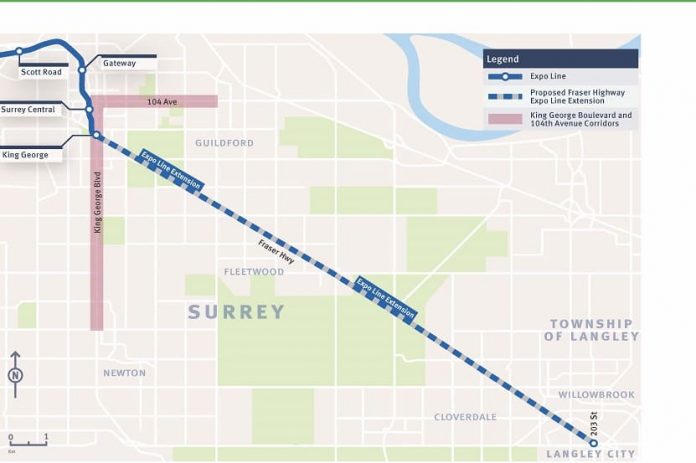PREMIER John Horgan must ensure that Surrey gets its share for public transit from the more than $19 billion federal investment that Prime Minister Justin Trudeau announced on Thursday “to help provinces and territories safely restart their economies and make our country more resilient to possible future waves of the virus.” B.C. expects to receive almost $2 billion and Horgan said that the government will put the funding towards important needs like health supports, supporting municipalities and transit, and helping the province’s most vulnerable.
One of the seven priority areas that Trudeau mentioned is “joint funding with the provinces and territories to support municipalities on the front lines of restarting the economy, including by putting in place precautions for public spaces and essential services to reduce the spread of the virus, as well as a dedicated stream of funding for public transit.”
Surrey should get the funds it needs to ensure that the SkyTrain extension to Langley is completed. Surrey is the second largest city in the province and is expected to be the largest in the coming years. It is also a political power house both provincially and federally.
Trudeau said that this investment, through the Safe Restart Agreement, will help address the key priorities, agreed upon by Canada’s First Ministers, for the safe restart of Canada’s economy over the next six to eight months. It will support measures to increase testing and contact tracing of the virus to protect Canadians from a future outbreak, and support the capacity of the health care systems, including services for people facing mental health challenges. It will also assist with the procurement of personal protective equipment to help our essential workers, and in protecting the most vulnerable, like our seniors.
The agreement will also help get funding quickly to municipalities so they can deliver essential services that Canadians rely on every day, like public transit. In addition, it includes actions to help Canadian workers during this challenging time, such as ensuring the availability of safe child care to help parents returning to work, and providing income support for people who do not have paid sick leave so all Canadians can stay healthy.
New federal funding will address seven priority areas:
* enhanced capacity for testing, contact tracing, and data management and information sharing to mitigate future outbreaks.
* investments in health care to respond to the pandemic, including support for Canadians experiencing challenges with substance use, mental health, or homelessness.
* support for vulnerable Canadians – including those in long-term care, home care, and palliative care – who are at risk of more severe cases of COVID-19.
* funding to secure a reliable source of personal protective equipment, and to recover some of the costs from previous investments made by provincial and territorial governments.
* support to ensure that safe and sufficient child care spaces are available to support parents’ gradual return to work.
* joint funding with the provinces and territories to support municipalities on the front lines of restarting the economy, including by putting in place precautions for public spaces and essential services to reduce the spread of the virus, as well as a dedicated stream of funding for public transit.
* a temporary income support program that will provide workers who do not have paid sick leave with access to 10 days of paid sick leave related to COVID-19.
To access the funding, each province and territory will need to outline how they will invest these funds.
